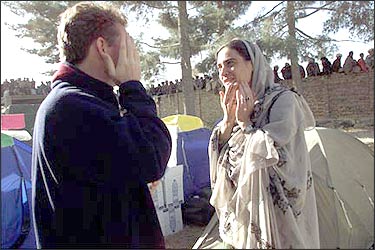
The Pakistani military intelligence agency has been diligently reconstituting the Taliban which it first created in 1994. The injection of this newly reconstituted Taliban back into Afghanistan represents something closer to an invasion by proxy than it does an insurgency. And secondly, Afghans, including Pashtuns in the south, have been bitterly disappointed by the behavior of the Karzai government. The word "corruption" does not do justice to the scale of the phenomenon. It is the people's objection to their treatment at the hands of government officials that explains the headway the Taliban "invasion" has made. In some cases, Afghans are making a calculated judgment: the Taliban are threatening all those who collaborate with the Afghan government, and the Afghan government is abusing the people. So why take the risk that allegiance to Kabul entails? In other cases, the Taliban are actually providing services in a more respectful and equitable fashion than the government. In other cases, people are turning to the Taliban simply out of a sense of outrage, as a kind of protest vote. None of these adds up to a groundswell of ideological support for the Taliban movement or an active desire for its return to power. More like acts of desperation by a population that has no means of recourse. Morocco RPCV Sarah Chayes has made a home in Kandahar, Afghanistan, became fluent in Pashto, one of the main Afghan languages, and devoted her energies to rebuilding a country gutted by two decades of war.
Sarah Chayes on Negotiating with the Taliban
Guest Blogger: Sarah Chayes on Negotiating with the Taliban
(Photo by Robin Holland)
There was one issue Bill and I did not have time to address in our interview today: the notion of negotiating with the Taliban.
It has been startling to witness the parade of international policy-makers, not to mention members of the Afghan government, now opining that way out of that country's gut-wrenching situation is to cut a deal with those who are victimizing its population. For, make no mistake, no matter how this prospect may be packaged, "reconciliation" with Taliban, at the level at which exploration is now underway, will involve some kind of power-sharing.
The proponents of this approach rest their case on a couple of fallacies. One is that "no insurgency has ever been defeated without negotiation" -- one of those assertions that takes on the force of truth by dint of repetition. It ignores all the diversity in texture and outcomes of insurrections down the years. Not to mention the question of whether what is happening in Afghanistan can really be called an insurgency.
This is not just a matter of semantics. The second fallacy, which I have heard perpetuated even by some Kabul-based Afghans, is that the Pashtuns in the Afghan south generally favor the Taliban. I live in Kandahar, the former heartland of Taliban leader Mullah Omar. I have lived there since the week he was chased out. I can attest that the support for the Karzai regime and its international backers at that time, and for the next several years, was unanimous. Kandaharis suffered the worst punishment at the hands of the draconian Taliban regime, and were delighted by its demise, and filled with hope for the new chapter in their nation's history that opened in December 2001.
Two things have happened since then. One is that the Pakistani military intelligence agency has been diligently reconstituting the Taliban which it first created in 1994. The injection of this newly reconstituted Taliban back into Afghanistan represents something closer to an invasion by proxy than it does an insurgency. And secondly, Afghans, including Pashtuns in the south, have been bitterly disappointed by the behavior of the Karzai government. The word "corruption" does not do justice to the scale of the phenomenon.
It is the people's objection to their treatment at the hands of government officials that explains the headway the Taliban "invasion" has made. In some cases, Afghans are making a calculated judgment: the Taliban are threatening all those who collaborate with the Afghan government, and the Afghan government is abusing the people. So why take the risk that allegiance to Kabul entails? In other cases, the Taliban are actually providing services in a more respectful and equitable fashion than the government. In other cases, people are turning to the Taliban simply out of a sense of outrage, as a kind of protest vote. None of these adds up to a groundswell of ideological support for the Taliban movement or an active desire for its return to power. More like acts of desperation by a population that has no means of recourse.
We, the international community -- led by the United States -- have never called to account any of the Afghan officials we ushered into power back in 2001, and have backed with our money, our weaponry, and our moral support, ever since.













